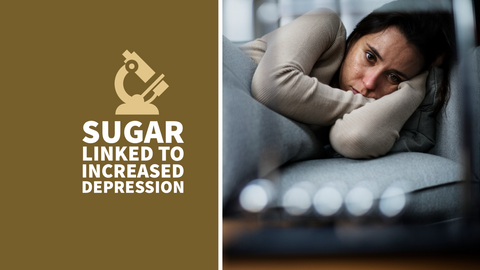A new study just came out that links sugar intake with depression in US adults This study observed 18,439 adults above the age of 20 and measured depressive symptoms. Though the study mainly shows an association, what's extremely interesting is that scientists adjusted for the following factors:
- Age
- Sex
- Race/ethnicity
- Poverty-income ratio
- Education
- Marital status
- Hypertension
- Diabetes
- Cardiovascular disease
- Alcohol and smoking
- Physical activity
- Daily energy intake
Despite adjusting for these factors and confounders, scientists noted that dietary sugar intake of 100 grams per day correlated with a 28% higher prevalence of depression!
High Sugar Foods
The following foods can easily take a person above the threshold of 100 grams of sugar per day:
- 2 sodas (20 oz each) = 130g
- 1 energy drink = 80g
- 4 sweetened coffee beverages = 120g
- 1-5 slices of cake (depending on sugar content) = 40-200g
- 3-10 servings of breakfast cereal = 50-200g
- 5 flavored yogurt cups = 100g
- 4-5 cups of fruit juice = 80-150g
- 13 tablespoons of sweet condiments = 104g
- 3-5 cocktails = 60-150g
- Pre-packaged and processed foods: Variable amounts, depending on sugar content, but could easily contribute to exceeding 100g of sugar when combined with other items above.
What About “Healthy” Sugars?
Dietary sugar includes fruit juices and honey along with other types of sugars such as coconut sugars and high-fructose corn syrup disregarding whether the sugars are organic or not. All variations of sugars may be contributing to this link between sugar intake and depression.
How To Maintain Sweetness Without the Calories
One of the best ways to cut down daily sugar intake is to replace sugary products with products sweetened with non-nutritive sweeteners. For instance, sugary sodas can be substituted with diet sodas. Our Energy Pods and CocoZen are innovative and tasty meal replacements and spread, respectively, made with zero-calorie and zero-glycemic sweeteners while being packed with essential nutrients.

